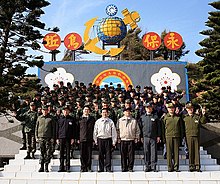烏坵
Appearance
See also: 乌丘
Chinese
[edit]a crow; black; not a crow; black; not; empty; void |
earthenware, earthenware vessel | ||
|---|---|---|---|
| trad. (烏坵) | 烏 | 坵 | |
| simp. (乌丘) | 乌 | 丘 | |

Etymology
[edit](This etymology is missing or incomplete. Please add to it, or discuss it at the Etymology scriptorium.)
Pronunciation
[edit]- Mandarin
- Cantonese (Jyutping): wu1 jau1
- Hakka (Sixian, PFS): Vû-hiu
- Puxian Min (Pouseng Ping'ing): ou1 ku1
- Southern Min (Hokkien, POJ): O͘-khiu / O͘-khu
- Mandarin
- (Standard Chinese)+
- Hanyu Pinyin:
- Zhuyin: ㄨ ㄑㄧㄡ
- Tongyong Pinyin: Wuciou
- Wade–Giles: Wu1-chʻiu1
- Yale: Wū-chyōu
- Gwoyeu Romatzyh: Uchiou
- Palladius: Уцю (Ucju)
- Sinological IPA (key): /u⁵⁵ t͡ɕʰi̯oʊ̯⁵⁵/
- (Standard Chinese)+
- Cantonese
- (Standard Cantonese, Guangzhou–Hong Kong)+
- Jyutping: wu1 jau1
- Yale: wū yāu
- Cantonese Pinyin: wu1 jau1
- Guangdong Romanization: wu1 yeo1
- Sinological IPA (key): /wuː⁵⁵ jɐu̯⁵⁵/
- (Standard Cantonese, Guangzhou–Hong Kong)+
- Hakka
- (Sixian, incl. Miaoli and Neipu)
- Pha̍k-fa-sṳ: Vû-hiu
- Hakka Romanization System: vuˊ hiu
- Hagfa Pinyim: vu1 hiu4
- Sinological IPA: /vu²⁴⁻¹¹ hi̯u⁵⁵/
- (Sixian, incl. Miaoli and Neipu)
- Puxian Min
- (Putian, Xianyou)
- Pouseng Ping'ing: ou1 ku1 [Phonetic: ou5 u1]
- Báⁿ-uā-ci̍: O-ku
- Sinological IPA (key): /ɔu⁵³³⁻²¹ (kʰ-)u⁵³³/
- (Putian, Xianyou)
- Southern Min
- (Hokkien: General Taiwanese)
- Pe̍h-ōe-jī: O͘-khiu
- Tâi-lô: Oo-khiu
- Phofsit Daibuun: o'qiw
- IPA (Taipei, Kaohsiung): /ɔ⁴⁴⁻³³ kʰiu⁴⁴/
- (Hokkien: variant in Taiwan)
- Pe̍h-ōe-jī: O͘-khu
- Tâi-lô: Oo-khu
- Phofsit Daibuun: o'qw
- IPA (Taipei, Kaohsiung): /ɔ⁴⁴⁻³³ kʰu⁴⁴/
- (Hokkien: General Taiwanese)
Proper noun
[edit]烏坵
- (~鄉) Wuqiu, Wuciou, Wuchiu (a rural township in Kinmen County, Taiwan)
- 烏坵嶼游擊隊……一九四五年四月某日,上級下達攻擊令,戰士們分乘五艘小船艇向目標烏坵島進發,健兒們緊握機槍、卡賓槍、衝鋒槍及手榴彈等,乘風破浪踏征途,因夜間天候近視線不清,加於海潮(東、南西北潮)交換不知飄流海上,直近午時分,始接近烏坵島,健兒們當即迅速涉水登岸,日軍營房進餐,健兒們先擲進兩枚手榴彈,随即展開猛烈射擊日軍十多人應聲倒地,並生擒日軍,擄獲裝備多種並破壞其設施,安全撤回。其順利勝利之戰役,全賴烏坵住民愛國情操作為內應,提供敵軍動態之正確情報與幫助,方成功全勝。 [Taiwanese Mandarin, trad.]
- From: 2017, Chuan Pei-Chi (傳培琦) 戴笠子弟兵傳培琦 in Kao Tan-Hua (高丹樺) 我的家鄉在烏坵 pp. 24-25, →ISBN, →OCLC
- Wūqiū Yǔ yóujīduì...... Yījiǔsìwǔ nián sìyuè mǒu rì, shàngjí xiàdá gōngjī lìng, zhànshìmen fēn chéng wǔ sōu xiǎo chuántǐng xiàng mùbiāo Wūqiū Dǎo jìnfā, jiàn'érmen jǐnwò jīqiāng, kǎbīnqiāng, chōngfēngqiāng jí shǒuliúdàn děng, chéngfēngpòlàng tà zhēngtú, yīn yèjiān tiānhòu jìn shìxiàn bùqīng, jiā yú hǎicháo (dōng, nán xī běi cháo) jiāohuàn bùzhī piāoliú hǎishàng, zhí jìn wǔ shífēn, shǐ jiējìn Wūqiū Dǎo, jiàn'érmen dāngjí xùnsù shèshuǐ dēng'àn, rìjūn yíngfáng jìncān, jiàn'érmen xiān zhíjìn liǎng méi shǒuliúdàn, suíjí zhǎnkāi měngliè shèjī rìjūn shí duō rén yìngshēng dǎodì, bìng shēngqín rìjūn, lǔhuò zhuāngbèi duōzhǒng bìng pòhuài qí shèshī, ānquán chèhuí. Qí shùnlì shènglì zhī zhànyì, quán lài wūqiū zhùmín àiguó qíngcāo zuòwèi nèiyìng, tígōng díjūn dòngtài zhī zhèngquè qíngbào yǔ bāngzhù, fāng chénggōng quánshèng. [Pinyin]
- Wuqiu Island Guerrilla Forces
On a certain day in April 1945, the superiors issued an assault order. The soldiers were divided into five small boats and headed towards the target Wuqiu Island. The fighters clenched on to their machine guns, carbines, submachine guns and grenades, etc, riding the wind and breaking the waves on the journey. Due to the bad weather at night, the line of sight was unclear, and the tide (east, south, north and west) exchange was unknown. At near noon, as we began to approach Wuqiu Island, the fighters immediately jumped in the water and landed on the shore. The Japanese army was eating in the barracks. The fighters first threw two grenades into their barracks, and then launched violent shooting. More than ten Japanese soldiers fell to the ground and several Japanese soldiers were captured as well as capturing various equipment and destroying their facilities before withdrawing safely.
The successful victory of the battle depends entirely on the internal response of the patriotism of the inhabitants of the Wuqiu; complete victory was due to their provision of correct intelligence and assistance on the enemy forces.
乌坵屿游击队……一九四五年四月某日,上级下达攻击令,战士们分乘五艘小船艇向目标乌坵岛进发,健儿们紧握机枪、卡宾枪、冲锋枪及手榴弹等,乘风破浪踏征途,因夜间天候近视线不清,加于海潮(东、南西北潮)交换不知飘流海上,直近午时分,始接近乌坵岛,健儿们当即迅速涉水登岸,日军营房进餐,健儿们先掷进两枚手榴弹,随即展开猛烈射击日军十多人应声倒地,并生擒日军,掳获装备多种并破坏其设施,安全撤回。其顺利胜利之战役,全赖乌坵住民爱国情操作为内应,提供敌军动态之正确情报与帮助,方成功全胜。 [Taiwanese Mandarin, simp.]
Descendants
[edit]Categories:
- Chinese lemmas
- Mandarin lemmas
- Cantonese lemmas
- Hakka lemmas
- Hokkien lemmas
- Puxian Min lemmas
- Chinese proper nouns
- Mandarin proper nouns
- Cantonese proper nouns
- Hakka proper nouns
- Hokkien proper nouns
- Puxian Min proper nouns
- Chinese terms with IPA pronunciation
- Chinese terms spelled with 烏
- Chinese terms spelled with 坵
- zh:Townships
- zh:Places in Kinmen County
- zh:Places in Taiwan
- Mandarin terms with quotations

